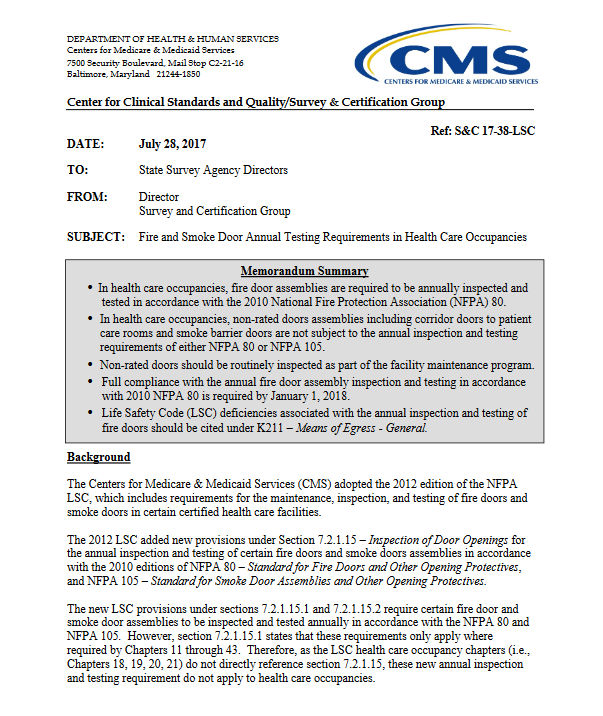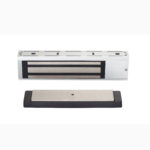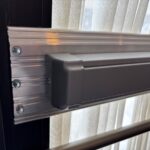
Page 1 of this memo states that the inspection requirements of Section 7.2.1.15 do NOT apply to health care occupancies, but Page 2 notes that Section 8.3.3.1 DOES apply and therefore fire door assembly inspections ARE required.
In July of 2016, the 2012 edition of NFPA 101 – The Life Safety Code, was adopted by the Centers for Medicare and Medicaid Services (CMS). This edition of the code has been used by CMS’ accrediting organizations, including the Joint Commission, since its adoption. The 2012 edition of NFPA 101 requires fire doors to be inspected annually, and references the 2010 edition of NFPA 80 – Standard for Fire Doors and Other Opening Protectives, which lists 11 inspection criteria for fire door assemblies.*
Simple, right? The inspection requirements have been included in NFPA 80 since 2007, and referenced by NFPA 101 since the 2009 edition. The International Fire Code (IFC) also references NFPA 80 regarding the ongoing maintenance of fire doors throughout the life of the building. The expectation within the door and hardware industry was that fire door assemblies would finally get the attention needed to keep them functioning as designed and tested, in order to help deter the spread of smoke and flames during a fire.
But the wheels of change sometimes move more sloooowly than we’d like. Enforcement of the annual inspection requirements in other occupancy types is still uncommon. Most insurance companies haven’t used this tool as many had hoped. Training can difficult to access for people who are interested in becoming fire door inspectors. Even CMS – an organization which typically issues directives that are followed without question – extended the deadline for fire door inspections, stating:
“CMS regulatory adoption of the 2012 LSC regulation was July 5, 2016, therefore the required annual door inspections and testing would be expected by July 6, 2017. However, considering the level of reported misunderstanding of this requirement, CMS has extended the compliance date for this requirement by six months. Full compliance with the annual fire door assembly inspection and testing in accordance with 2010 NFPA 80 is required by January 1, 2018.”
The extended deadline has now passed (the memo is here). Facilities that receive funding from Medicare and/or Medicaid must have fire door assembly inspections conducted annually and documented, with any deficiencies repaired “without delay.” This is a big step in the right direction, but there is still a lot of work to be done.
- How can enforcement be extended to other types of occupancies in the near future?
- What training is available to more rapidly increase the number of qualified fire door inspectors?
- Should the initial inspection be included in project specifications to ensure that the doors are installed properly? There is some recommended specification language here…any recommendations for updates?
- What is the best way to inform and educate more people on these requirements and fire doors in general?.
WWYD?
* NFPA 105 – Standard for Smoke Door Assemblies and Other Opening Protectives also includes inspection requirements, but technically these only apply to doors that are required to comply with NFPA 105 – currently in very limited locations.
~~~
For more information about fire door assemblies, visit the Fire Door page of this site.
You need to login or register to bookmark/favorite this content.





IMO, it would be redundant to specify annual fire door inspections because NFPA-80 is typically listed under “References” in Part 1 of 08 71 00.
As an inspection and installation company I have noticed recently architects adding the inspection requirements by a certified FDAI in the hardware specifications
Interesting….A couple of questions:
1. How is this being enforced? By whom?
2. Is there a way to find out which specific facilities are impacted? How would our FDAI inspectors find them?
1. The accrediting organizations, including the Joint Commission, are enforcing this requirement when they conduct their surveys which I believe typically happen every 3 years.
2. The Joint Commission is the largest AO, and accredits about 4500 facilities. You can download information about all of the facilities by going to this page and clicking Data Download on the top right: https://www.qualitycheck.org/
– Lori